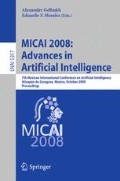Abstract
The main objective of this paper aims at developing a methodology that takes into account the human factor extracted from the several information sources of the organization of the recommender systems. This methodology is capable of extracting the Human Values Scale from the user, with reference to his/her features, in order to improve the adaptation of the Recommender Systems. This research is focused on the analysis of human values scale using the Portrait Values Questionnaire of Schwartz, which can take advantage of the several information sources of the organization through its attributes to define the methodology that response with more exactitude to preferences and interests of the user. This paper presents a demonstration of how the Human Values Scale of a user can be extracted from several information sources of the organization. A case study is presented to apply the methodology, in an effort to extract the user human values scale from bank domains.
Access this chapter
Tax calculation will be finalised at checkout
Purchases are for personal use only
Preview
Unable to display preview. Download preview PDF.
References
Burke, R.: Hybrid recommender systems: Survey and experiments. User Modeling and User-Adapted Interaction 12(4) (2002)
Chesñevar, C., Maguitman, A.: ARGUENET: An Argument-Based Recommender System for Solving Web Search Queries. In: IEEE Conference on Intelligent Systems, Varna, Bulgaria (2004)
Chesñevar, C.I., Dix, J., Stolzenburg, F., Simari, G.R.: Relating Defeasible and Normal Logic Programming through Transformation Properties. Theoretical Computer Science 290(1) (2003)
González, G., López, B., de la Rosa, J.L.: A Multi-agent Smart User Model for Cross-domain Recommender Systems. In: Proceedings of Beyond Personalization 2005: The Next Stage of Recommender Systems Research, International Conference on Intelligent User Interfaces IUI 2005, San Diego, California, USA (2005)
Gouveia, V.V., Clemente, M., Vidal, M.A.: El cuestionario de valores de Schwartz (CVS): propuesta de adaptación en el formato de respuesta. Revista de Psicología Social 3(15) (1998)
Guzmán, J.: Research Work Report: Methodology to obtain the user’s Human Values Scale from Smart User Models, Department of Electronics, Computer Science and Automatic Control University of Girona, Spain (2005), http://eia.udg.es/~jguzmano/PublicacionesJGO.htm/ResearchWork-JGO
Guzmán, J., González, G., de la Rosa, J.L., Castán, J.A.: Modelling the Human Values Scale in Recommender Systems: A First Approach. Frontiers in Artificial Intelligence and Applications Series Book, vol. 131. IOS Press, Amsterdam (2005)
Carter, J., Ghorbani, A.: Value Centric Trust in Multiagent Systems, Faculty of Computer Science. University of New Brunswick Fredericton, NB, E3B 5A3, Canada (2004)
Jensen, T.: New Consumers and New Communities in Consumption (2002)
Kobsa, A.: Generic User Modeling Systems. In: User Modelling and User-Adapted Interaction. Kluwer Academic Publishers, Netherlands (2001)
Ravlin, E.C., Meglino, B.M.: Effect of values on perception and decision making: A study of alternative work values Measure. Journal of Applied Psychology (1987)
Schwartz, S.H.: A theory of cultural values and some implications for work. Applied Psychology: An International Review (1999)
Schwartz, S.H.: A Proposal for Measuring Value Orientations across Nations. The Hebrew University of Jerusalem, Jerusalem (2003)
Author information
Authors and Affiliations
Editor information
Editors and Affiliations
Rights and permissions
Copyright information
© 2008 Springer-Verlag Berlin Heidelberg
About this paper
Cite this paper
Guzmán-Obando, J., de la Rosa, J.L., Aciar, S., Montaner, M., Castán, J.A., Laria, J. (2008). The User’s Human Values Scale Methodology in Recommender Systems from Several Information Sources of the Organization. In: Gelbukh, A., Morales, E.F. (eds) MICAI 2008: Advances in Artificial Intelligence. MICAI 2008. Lecture Notes in Computer Science(), vol 5317. Springer, Berlin, Heidelberg. https://doi.org/10.1007/978-3-540-88636-5_85
Download citation
DOI: https://doi.org/10.1007/978-3-540-88636-5_85
Publisher Name: Springer, Berlin, Heidelberg
Print ISBN: 978-3-540-88635-8
Online ISBN: 978-3-540-88636-5
eBook Packages: Computer ScienceComputer Science (R0)

